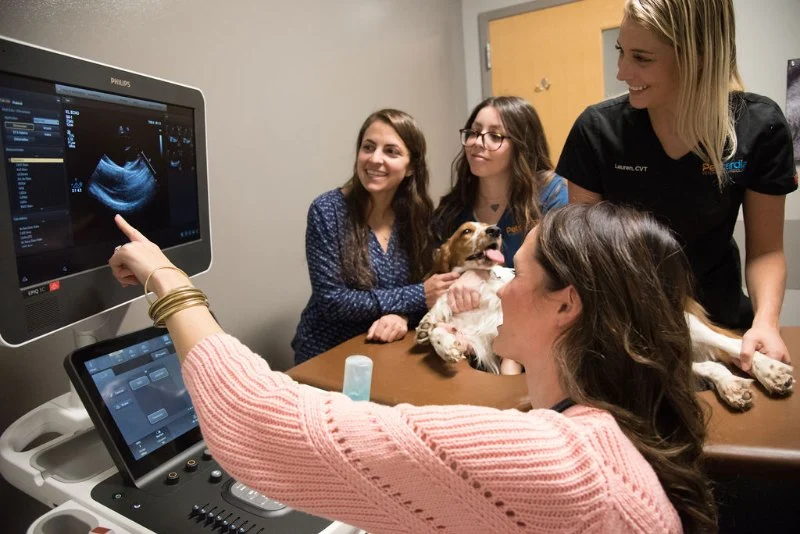
- Understanding Specialist Vets
- Types of Veterinary Specialists
- When to See a Specialist Vet
- How to Choose the Right Specialist Vet
- Questions to Ask a Specialist Vet
1. Understanding Specialist Vets
Specialist vets are veterinarians who have advanced training and certification in specific areas of veterinary medicine. Unlike general practitioners, specialist vets focus on particular fields such as cardiology, orthopedics, or neurology. Choosing a specialist vet is essential when your pet requires expert care beyond the scope of a general vet's capabilities.
In this guide, we'll help you understand the different types of veterinary specialists and provide practical tips on how to find the right specialist vet for your pet's needs in California. Whether it's dealing with a heart condition, joint issues, or neurological problems, selecting the right specialist is crucial for your pet’s health and well-being.

Locust Trace Veterinary Clinic Lexington KY
LexingtonFayette CountyKentucky
3591 Leestown Rd, Lexington, KY 40511, USA
2. Types of Veterinary Specialists
Veterinary specialists are typically classified based on their areas of expertise. Below are the main types of veterinary specialists and what they focus on:

The Pet Dental Clinic
Queen CreekMaricopa CountyArizona
18521 E Queen Creek Rd #107, Queen Creek, AZ 85142, USA
2.1 Veterinary Cardiologists
A veterinary cardiologist specializes in diagnosing and treating heart-related conditions in animals. If your pet is suffering from heart murmurs, arrhythmias, or congenital heart defects, a veterinary cardiologist will provide specialized care to manage and treat these issues effectively. Early detection and treatment by a cardiologist can significantly improve the quality of life for pets with heart conditions.
2.2 Veterinary Orthopedists
Veterinary orthopedists focus on diagnosing and treating bone, joint, and soft tissue disorders. If your pet is experiencing limping, arthritis, or fractures, an orthopedic specialist is equipped to provide the most advanced treatment options. Orthopedic specialists perform surgeries, recommend rehabilitation, and help manage long-term joint and bone conditions.
2.3 Veterinary Neurologists
A veterinary neurologist specializes in diagnosing and treating disorders of the brain, spine, and nervous system. If your pet shows signs of seizures, mobility issues, or neurological diseases, a neurologist can perform advanced diagnostic tests and recommend treatments. Neurological issues are complex and may require a variety of approaches, including medication, surgery, or therapy.
3. When to See a Specialist Vet
There are specific situations where seeing a specialist vet is necessary. While your regular vet may be able to handle routine checkups and general issues, certain conditions require specialized expertise.
3.1 Persistent Symptoms
If your pet’s condition does not improve despite treatment, it's time to consult a specialist. For example, if your pet has been on medication for a heart condition but continues to show signs of distress, a veterinary cardiologist can offer more specialized treatment.
3.2 Complex Conditions
Some conditions are too complex or specific for a general vet to handle. For example, if your pet is suffering from a neurological disorder such as epilepsy or paralysis, a veterinary neurologist’s expertise is essential for proper diagnosis and treatment.
3.3 Surgical Needs
If your pet requires surgery, especially for bone fractures, spinal issues, or cardiac conditions, an orthopedic or cardiology specialist will have the training and experience to perform advanced surgical procedures safely.
4. How to Choose the Right Specialist Vet
Choosing the right specialist vet for your pet is crucial. Here are some key factors to consider when making your decision:
4.1 Qualifications and Certification
Ensure that the specialist is board-certified in their field. This indicates that they have undergone additional training and passed rigorous exams to be recognized as an expert in their area of veterinary medicine. Certification adds credibility to the specialist's qualifications.
4.2 Experience and Reputation
Look for specialists with significant experience in treating the condition your pet is facing. Checking reviews, asking for recommendations, and seeking referrals from your primary vet can help you find a trusted specialist. You can also inquire about the specialist’s success rates with cases similar to your pet's condition.
4.3 Communication and Comfort
Choose a specialist vet who is not only knowledgeable but also makes you and your pet feel comfortable. Good communication is essential, as you need to feel confident in the specialist’s ability to explain complex conditions and treatment options clearly.
5. Questions to Ask a Specialist Vet
Before scheduling an appointment with a specialist, prepare a list of questions to ensure they are the right fit for your pet’s needs. Here are some important questions to ask:
5.1 What is your experience with this specific condition?
This question will help you gauge the specialist's familiarity and success rate with the particular issue your pet is facing. Experience in similar cases is essential for effective treatment.
5.2 What treatment options do you recommend?
Understanding the range of treatment options available, including non-invasive methods, surgery, or medication, will allow you to make an informed decision about your pet’s care.
5.3 What is the estimated cost of treatment?
Specialized care often comes with a higher cost, so it's important to get an estimate of the financial commitment involved. Ask about the total cost of treatment, including any follow-up visits or additional therapies that might be needed.
5.4 What follow-up care will be necessary?
Inquire about the need for ongoing care or rehabilitation after treatment. Some conditions may require long-term management or rehabilitation to ensure the best possible outcome for your pet.
Finding the right specialist vet for your pet is crucial to ensure they receive the best care possible. By understanding the different types of specialists available, knowing when to seek specialized care, and asking the right questions, you can make an informed choice for your pet’s health. For more expert guidance and recommendations, visit Pet & Puppy for the best pet care products and services.







 Mill Creek Veterinary Center4.0 (289 reviews)
Mill Creek Veterinary Center4.0 (289 reviews) Tucker Veterinary Clinic4.0 (61 reviews)
Tucker Veterinary Clinic4.0 (61 reviews) Glenfair Veterinary Hospital4.0 (344 reviews)
Glenfair Veterinary Hospital4.0 (344 reviews) Ridgeline Veterinary Services4.0 (74 reviews)
Ridgeline Veterinary Services4.0 (74 reviews) All Breed Pet Care LLC4.0 (254 reviews)
All Breed Pet Care LLC4.0 (254 reviews) Cross Creek Equine5.0 (1 reviews)
Cross Creek Equine5.0 (1 reviews) Genetic Testing for Pets: What You Can Learn & What’s Useful
Genetic Testing for Pets: What You Can Learn & What’s Useful Safe Plants & Landscaping for Homes with Pets: Creating a Pet-Friendly Yard
Safe Plants & Landscaping for Homes with Pets: Creating a Pet-Friendly Yard How to Teach Your Pet to Sleep on Their Own Bed
How to Teach Your Pet to Sleep on Their Own Bed Managing Chronic Conditions in Pets: Essential Diet, Medication & Lifestyle Tips
Managing Chronic Conditions in Pets: Essential Diet, Medication & Lifestyle Tips Why Some Pets Reject New Food & How to Smooth the Transition
Why Some Pets Reject New Food & How to Smooth the Transition How to Vet a New Pet Food Brand: 10 Warning Flags
How to Vet a New Pet Food Brand: 10 Warning Flags